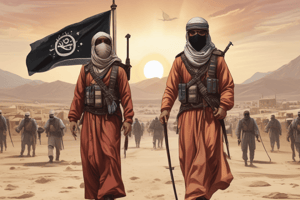Podcast
Questions and Answers
Kto był jednym z założycieli Al-Kaidy?
Kto był jednym z założycieli Al-Kaidy?
- Osama bin Laden (correct)
- Muammar al-Kaddafi
- Saddam Hussein
- Bashar al-Asad
Jaki jest główny cel ideologiczny Al-Kaidy?
Jaki jest główny cel ideologiczny Al-Kaidy?
- Odzyskanie terytoriów w Azji Południowej
- Rozbicie unii europejskiej
- Ekonomiczne podporządkowanie Afryki
- Ustanowienie globalnego kalifatu islamskiego (correct)
Które wydarzenie jest najbardziej znane związane z działalnością Al-Kaidy?
Które wydarzenie jest najbardziej znane związane z działalnością Al-Kaidy?
- Ataki z 11 września w Stanach Zjednoczonych (correct)
- Wojna domowa w Syrii
- Konflikt w Jemenie
- Anschluss Austrii
Które państwa Al-Kaida uważa za główne przeszkody w realizacji swoich celów?
Które państwa Al-Kaida uważa za główne przeszkody w realizacji swoich celów?
Z kim Osama bin Laden nawiązał relacje podczas walki przeciwko inwazji sowieckiej na Afganistan?
Z kim Osama bin Laden nawiązał relacje podczas walki przeciwko inwazji sowieckiej na Afganistan?
Które wydarzenie nie było przeprowadzone przez Al-Kaidę?
Które wydarzenie nie było przeprowadzone przez Al-Kaidę?
Co zrobiły Stany Zjednoczone i ich sojusznicy w odpowiedzi na działalność Al-Kaidy?
Co zrobiły Stany Zjednoczone i ich sojusznicy w odpowiedzi na działalność Al-Kaidy?
Kto zastąpił Osamę bin Ladena po jego śmierci w maju 2011 roku?
Kto zastąpił Osamę bin Ladena po jego śmierci w maju 2011 roku?
Jak jest budowa struktury przywództwa Al-Kaidy?
Jak jest budowa struktury przywództwa Al-Kaidy?
Co zaznacza tekst jako działanie mające na celu zwalczanie terroryzmu?
Co zaznacza tekst jako działanie mające na celu zwalczanie terroryzmu?
Flashcards are hidden until you start studying
Study Notes
Al-Qaeda: A Brief Overview
Al-Qaeda, often stylized as القاعدة in Arabic, has been a prominent name in global politics and security since its emergence in the 1980s. This organization, which translates to "The Base" in English, has played a significant role in shaping modern terrorism and counterterrorism efforts.
Origins and Development
Al-Qaeda's roots stretch back to the 1980s, when a young Saudi Arabian named Osama bin Laden joined the Islamic jihad against the Soviet invasion of Afghanistan. He established relationships with like-minded fighters, among them Abu Ubaidah al-Banshiri and Ayman al-Zawahiri, future key figures in Al-Qaeda's leadership. After the Soviet withdrawal from Afghanistan, bin Laden established bases in Sudan and later returned to Afghanistan, where he met and befriended the Taliban's leaders.
Goals and Ideology
Al-Qaeda's ideology is rooted in a fundamentalist interpretation of Islam and a desire to establish a global Islamic caliphate. Bin Laden and other leaders saw the United States and its Western allies as the primary obstacles to this goal, as they supported what they viewed as morally corrupt regimes in the Middle East. The organization aimed to re-establish the Islamic empire, ridding it of Western influence and "un-Islamic" practices.
Terrorist Attacks
Al-Qaeda is perhaps most notorious for its role in the 9/11 attacks in the United States, which resulted in the deaths of over 3,000 people. However, the organization was involved in numerous other attacks before and after 9/11. These included the 1993 World Trade Center bombing, the 1998 U.S. Embassy bombings in Africa, and the 2000 attack on the USS Cole in Yemen.
Counterterrorism Efforts
In response to Al-Qaeda's activities, the United States and its allies have implemented various counterterrorism measures. These include military operations, such as the U.S.-led invasions of Afghanistan in 2001 and Iraq in 2003, as well as efforts to disrupt the organization's financing and recruitment networks. The United Nations has also passed numerous resolutions aimed at combating terrorism and freezing the assets of Al-Qaeda-affiliated groups.
Leadership Structure
Throughout its history, Al-Qaeda has undergone a number of leadership changes. Bin Laden was succeeded by Ayman al-Zawahiri, a longtime associate, after the former's death in May 2011. However, al-Zawahiri was eventually killed in a U.S. drone strike in August 2022. Al-Qaeda's leadership structure is decentralized, with regional affiliates operating semi-autonomously. The organization's current leader has not been officially confirmed, and it is unclear whether the group remains a coherent and coordinated threat.
Al-Qaeda's story is a complex one, and its impact on the global stage has been profound. By understanding its origins, goals, and activities, we can better appreciate the challenges and opportunities posed by the ongoing struggle against terrorism.
Studying That Suits You
Use AI to generate personalized quizzes and flashcards to suit your learning preferences.




